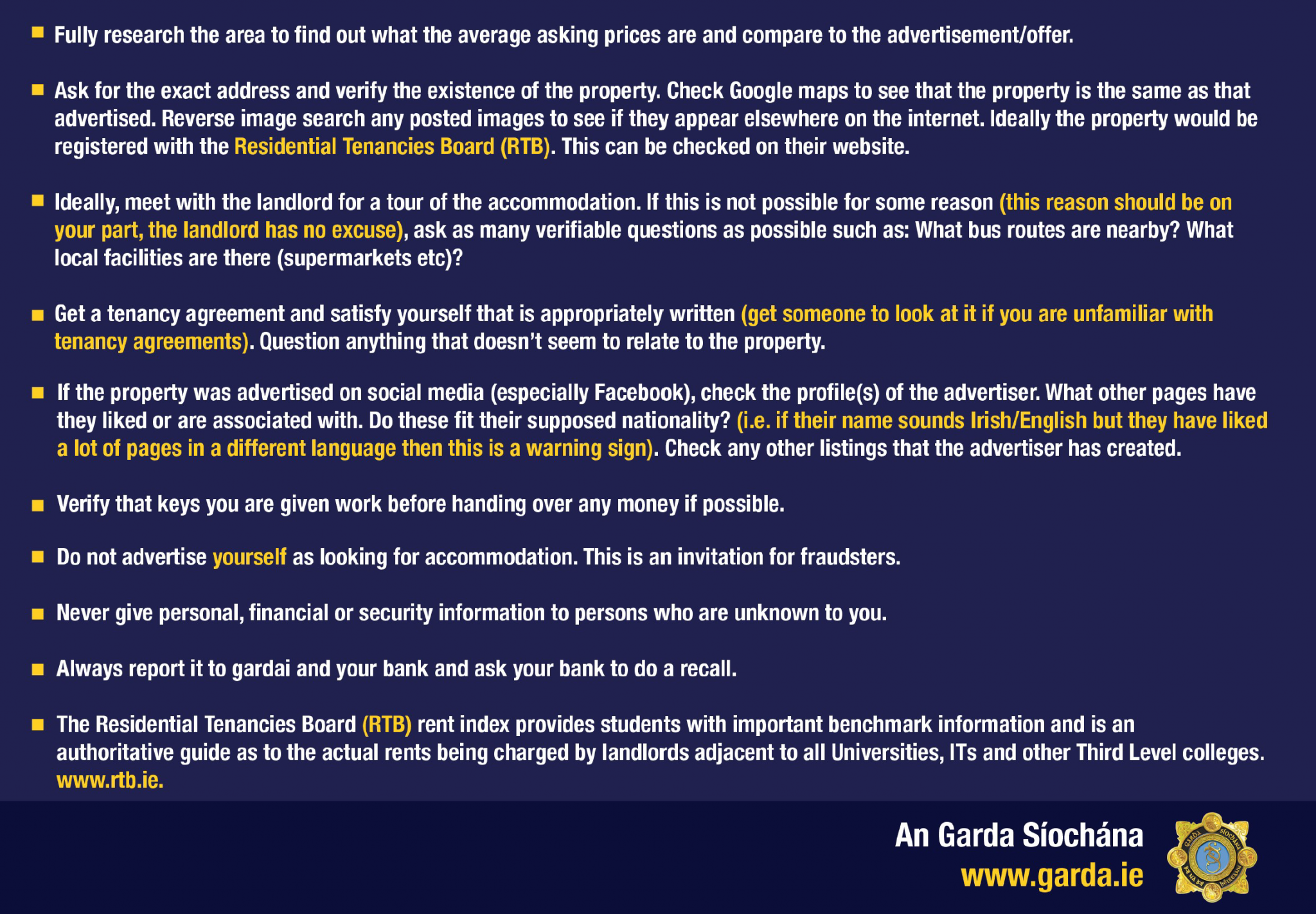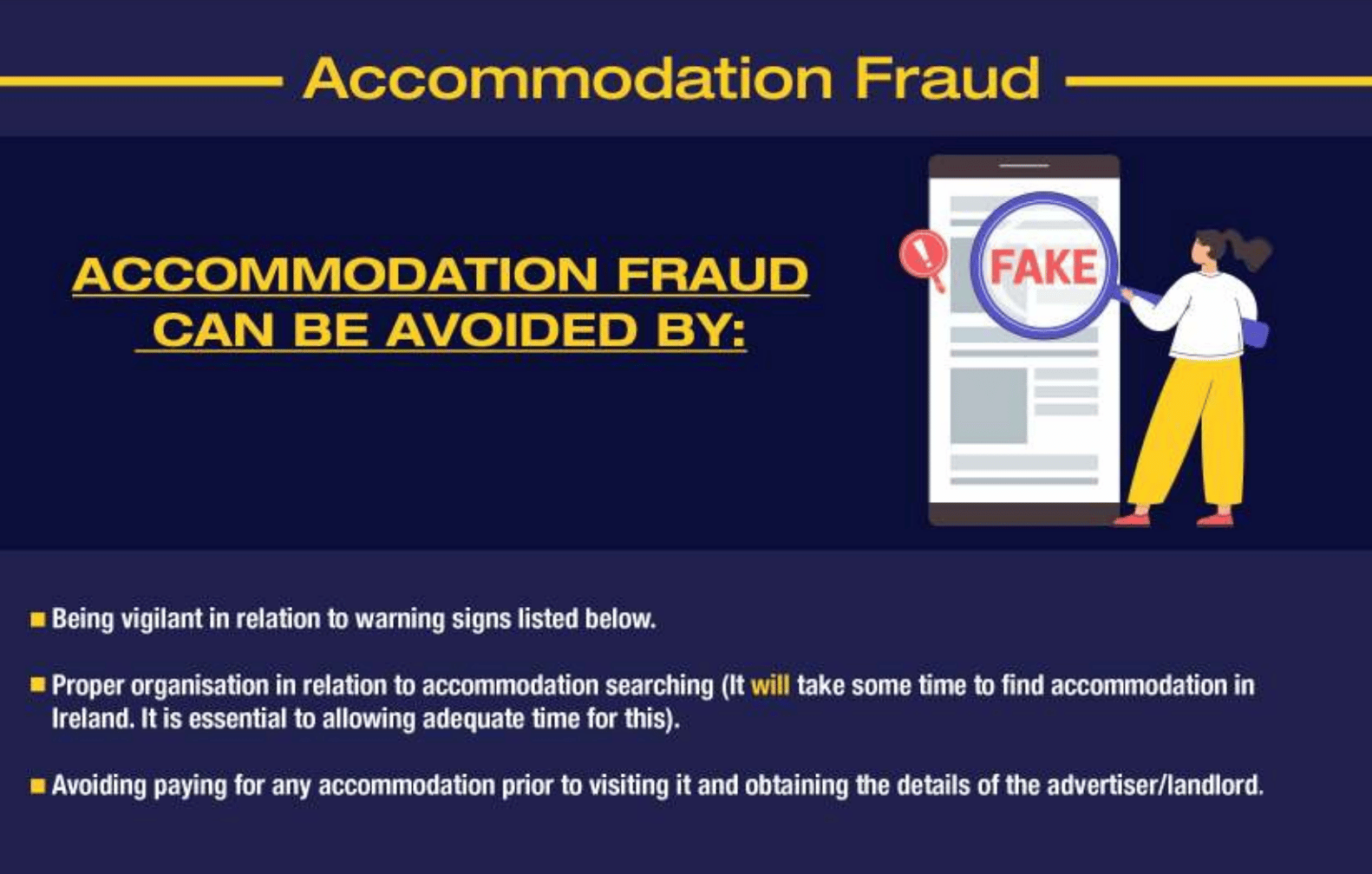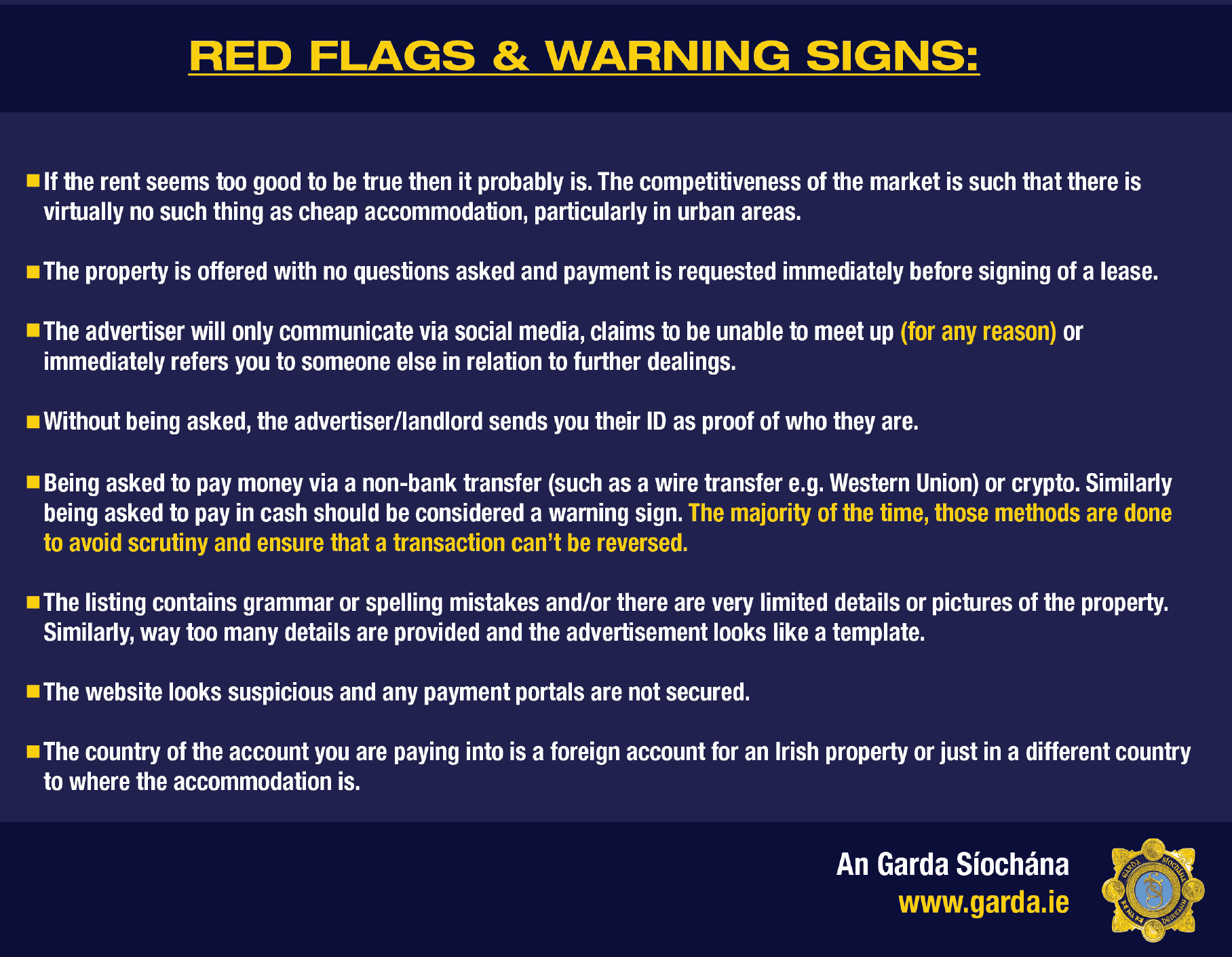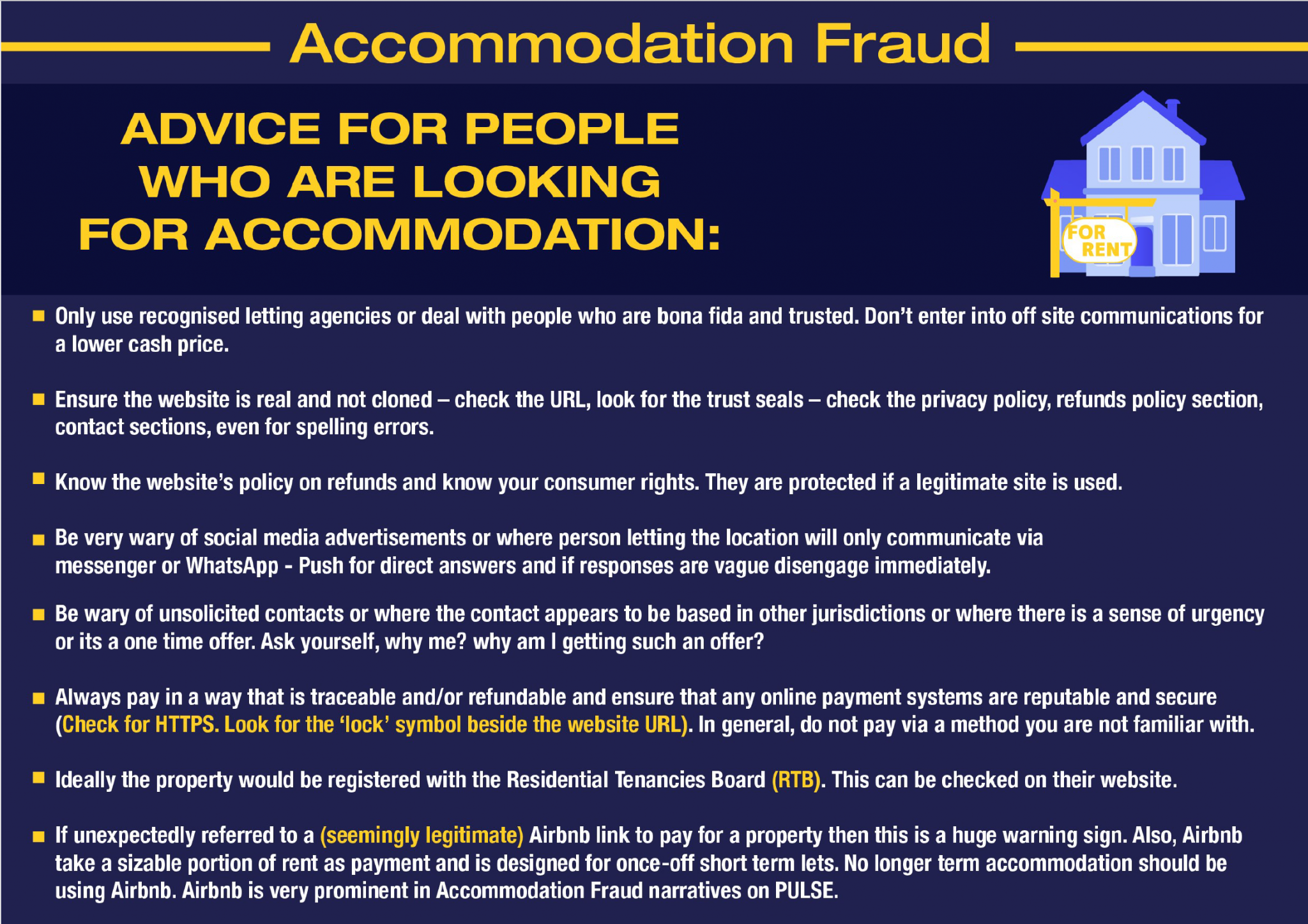Tenants are being advised to be cautious of a variety of rental scams. In this article, you will some useful information about scams related to renting:
Rise in accommodation fraud and scams
With the increase in demand for accommodation, so too has there been a rise in rental fraud and scams.
The end of summer (August to October) is a particular target time for criminals as students and their families have a clear urgency for new homes. Experienced scammers will be prepared to catch people off guard during this time.
How much money has been stolen in scams?
An average amount of €1,300 is stolen in rental scams. In Ireland, a total of €291,452 was stolen from tenants in 2022.
Tenants new to the rental market should familiarise themselves with the law around the renting sector. A good starting point is the Residential Tenancies Board website. Threshold is another great website that provides free, confidential advice to anyone in Ireland experiencing tenancy issues.
The current competition for rental properties means that landlords can have their pick of tenants. Scammers are taking advantage of this competitive rental market by hurrying their victims into making quick decisions.

Types of rental scams
Usually, accommodation scams fall into three broad categories:
- Since the landlord claims to be out of the country, they can’t show you the property. However, they request a deposit upfront.
- The scammer is living at the property and shows it to a number of people. They will secure deposits from several before disappearing with the money.
- The transaction appears normal. This is until the renter finds that the keys don’t work and the landlord has disappeared.
Be Informed
Spend time doing research. What is the current average rent price of accommodation in the area? You can use online maps to verify that the property you are interested in actually exists. You can also check it is at the stated address.
Have a look at short-term rental websites to ensure any potential fraudsters are not using the property for “viewings”. This might result in the fraudster potentially might taking your deposit.
Red flags
These are some red flags to look out for when booking accommodation:
- If the rent seems too good to be true; then it is probably a scam.
- The listing contains grammar or spelling mistakes and is on social media.
- All communication is only via WhatsApp or social media.
- The landlord is away and unable to meet up to show you the property in person.
- Property is offered with no questions asked. Payment is demanded immediately before signing the lease.
- Requested to pay in cash/PayPal/wire transfer/iTunes gift cards or cryptocurrency.
- The account to pay into is in a different country.

Follow these three instructions to avoid rental scams
-
1. Check the property
- First, establish that the property exists and is available for rent.
- Check the identity of the landlord or agent. Request a copy of a driver’s licence or photo identification.
- It is always better to be safe. Don’t rush into any arrangement that looks too good to be true.
- Check the URL to ensure it’s a real website. Take note of the privacy and refund policy sections.
- Do a landlord check through the Residential Tenancies Board website.
- Use a booking agent or hotel website directly if booking a holiday rental. If it is a third-party website, ensure it is secure.
-
2. Be cautious
- Pay the deposit to the landlord. Do not pay the person leaving the property or anyone else.
- Ideally, only do business with legitimate, well-known, established rental agencies. Alternatively, deal with people who are bona fide and trusted.
- Bring a friend or family member with you to view the property.
- Use cheques or bank drafts to pay the deposit. Keep copies of all receipts of payments.
- You can check any IBAN bank details supplied for payment using free online checking tools. These will show where the bank account is based.
- Do not hand over any cash to anyone. This is because you will not have a record or be able to trace your deposit.
- Only use trusted money transfer systems such as credit cards.
- Keep track of all correspondence between you and the advertiser, e.g. bank details, advertisement etc.
-
3. Stay alert
- Meet the prospective landlord in the accommodation.
- Ensure the keys of the property fit. Open the door lock and sign a rental contract prior to payment of the deposit.
- Be careful of social media advertisements, especially if the person letting the location will only communicate via messenger or WhatsApp.
- Push for direct answers. If responses are vague, disengage immediately.
- Watch out for “unsolicited contacts” or where the contact appears to be based in other jurisdictions. This is especially important if there is a sense of urgency like “a one-time offer”.
- Ask yourself why a person living and letting out a property in Ireland would have a bank account based in the UK, Holland or anywhere abroad.
Do you think you are a victim of rental scams?
Gardaí advised members of the public who believe they are a victim of accommodation fraud to contact any Garda station and report the crime.
Use any phone numbers or email addresses to monitor for future activities of criminals. Anyone can fall victim to a rental scam. Ask anyone who finds themselves in this situation to report it to Threshold, as well as to An Garda Síochána.
“While Threshold cannot help to recover the lost money, alerting us will help to prevent other people from falling victim,” said Inspector Steven Meighan of the GNECB.
Rental scams resources
Check out the resources provided by An Garda to avoid accommodation fraud:

Useful Websites
Competition and Consumer Protection Commission
Interesting Articles
Renters warned of scams amid increase in accommodation fraud– Irish Times
‘The family turned up to move in but the real owners knew nothing about it’ – Garda warning as €500,000 lost to rent scams – Independent
Renters warned of scams amid increase in accommodation fraud – Irish Times
‘Exercise particular caution’: Here’s how to make sure you don’t fall victim to a fake rental scam – The Journal
The clever renting scam that’s catching Irish students out – what you need to watch out for – Irish Mirror
Gardai issue tips to students on how to avoid getting scammed while renting property – Irish Mirror
Checklist for Students Renting for the First Time’ – RTB
Here’s how to make sure you don’t fall victim to a fake rental scam – The Journal









